Directed by Alfred Hitchcock
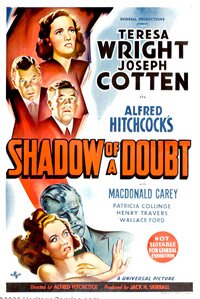 It’s claimed by many that Shadow of a Doubt was Alfred Hitchcock’s favourite of all the films he had made; some say he considered it his best. The claim rings true if you’re even modestly familiar with his films, his preoccupations and his humour. You can understand how the story would delight him.
It’s claimed by many that Shadow of a Doubt was Alfred Hitchcock’s favourite of all the films he had made; some say he considered it his best. The claim rings true if you’re even modestly familiar with his films, his preoccupations and his humour. You can understand how the story would delight him.
Shadow of a Doubt presents us with an almost quintessential American town of the 1940’s. It’s almost Capra-esque. In a way, Shadow of a Doubt is George Bailey’s Bedford Falls from It’s a Wonderful Life except where Capra brings an angel to it, Hitchcock brings the devil.
His name is Uncle Charlie and he’s played by Joseph Cotten with delicious charm that alternates with brooding self-obsession.
Into the charmed and innocent life of California’s little Santa Rosa, into the home of the all-American family of the Newtons, comes Mom’s little brother, Uncle Charlie, for a visit of no determined length. He’s welcomed with cheerful enthusiasm by his sister Emma (Patricia Collinge), and by his namesake niece Young Charlie (Teresa Wright).
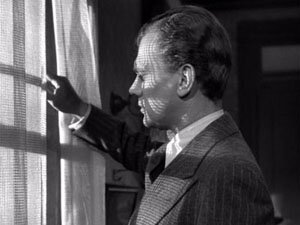 Unfortunately, no one is aware that Uncle Charlie, pleasant as he seems, is a psychopathic killer, a man who behind his charm hates the world and everyone in it.
Unfortunately, no one is aware that Uncle Charlie, pleasant as he seems, is a psychopathic killer, a man who behind his charm hates the world and everyone in it.
Uncle Charlie’s secret view of the world is important as it’s in direct contrast with the Newton view, especially Young Charlie’s. Cotton’s character represents corruption; Wright’s represents innocence. The film can broadly be seen as a loss of innocence.
As the film opens, we meet Uncle Charlie and immediately become aware that he has a dark secret. Two men are after him, though we’re not sure who they are (I think we assume it’s the police though we’re not told this right away). Charlie is on the run but we don’t know why.
He escapes and goes to his sister’s family in Santa Rosa. When he arrives by train Hitchcock visually telegraphs what is about to happen. It’s a bright, sunny day and the family run down the platform to meet the train. The youngest child of the Newton’s is isolated for a moment on the platform, in the sun. As the train pulls up it’s dark shadow moves along the platform engulfing the child.
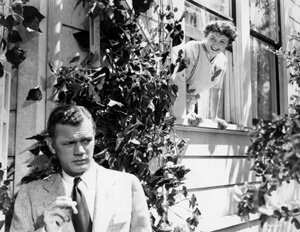 We then seen an apparently weak and ill Charlie get off the train. He’s bent over and almost hobbles. But as he sees the Newtons his face changes, he puts on a facade of charm, straightens up and in an instant is the picture of happy health.
We then seen an apparently weak and ill Charlie get off the train. He’s bent over and almost hobbles. But as he sees the Newtons his face changes, he puts on a facade of charm, straightens up and in an instant is the picture of happy health.
Alone, Charlie is quiet and brooding. Amongst others, he’s vibrant and witty. Only every now and then does he reveal himself publicly. When he does, he quickly covers for his mistake.
Within the family, Teresa Wright’s Young Charlie is easily the brightest, most perceptive member. Although she hero-worships Uncle Charlie, she quickly sees there is something about him that isn’t right. But because she loves her uncle the way she does, she won’t admit to herself the truth about her uncle.
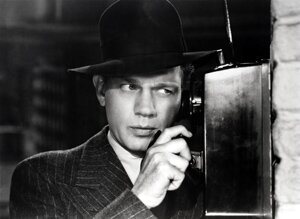 The law catches up with Uncle Charlie, however, and soon Young Charlie is enlisted by the police to help them catch him. Uncle Charlie then discovers his niece knows his secret, or at least that she’s aware he has one, and has to deal with this threat to himself.
The law catches up with Uncle Charlie, however, and soon Young Charlie is enlisted by the police to help them catch him. Uncle Charlie then discovers his niece knows his secret, or at least that she’s aware he has one, and has to deal with this threat to himself.
The contest soon becomes one between Uncle Charlie and his niece and the suspense builds to its crescendo – all very Alfred Hitchcock like.
It’s a perfect Hitchcock film. It’s easily one of the best and an argument could be made for it being the best. Shadow of a Doubt is not sensational in the way of movies like Psycho or The Birds. It’s subtler and quieter and in some ways more menacing because of this.
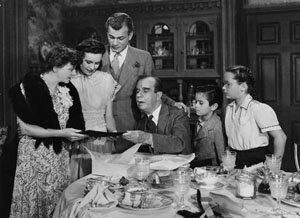 It evokes idyllic America then slowly peals back its layers to reveal a darkness beneath. (This is wonderfully illustrated when the two Charlie’s step off the Norman Rockwell main street into the smokey bar and meet the bored, defeated waitress – a kind of dark opposite of Young Charlie.)
It evokes idyllic America then slowly peals back its layers to reveal a darkness beneath. (This is wonderfully illustrated when the two Charlie’s step off the Norman Rockwell main street into the smokey bar and meet the bored, defeated waitress – a kind of dark opposite of Young Charlie.)
The DVD of Shadow of a Doubt is pretty good but certainly not flawless. There is some scratching and a few awkward jumps, though nothing alarming. The image, however, is pretty solid and the sound is good for a film of this period. The disc also has Beyond Doubt: The Making of Hitchcock’s Favorite Film, an informative feature that includes the thoughts of Teresa Wright, Hume Cronyn and Peter Bogdanovich among others.



n ps q esto esta muy chido